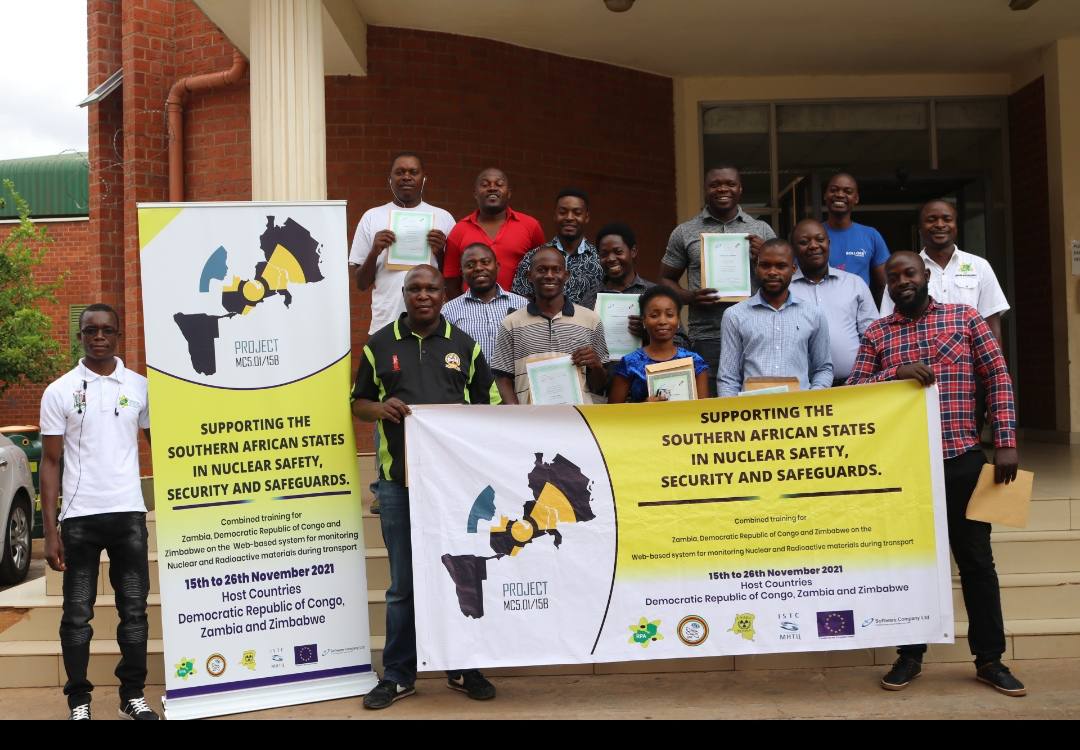Regulators from Zambian and from Zimbabwe jointly inspect radioactive material shipment at Chirundu border crossing between the two states

 The real time exercise on the application of the Information Tracking System (ITS), organized within the SADC Project and involving DRC, Zambia and Zimbabwe draws close to completion. The trucks that started their journey on 22 November from Lubumbashi, DRC, crossed into Zambia at Kasumbalesa and in the evening hours of 25 November reached the Zimbabwean border at the Chirundu check point. This border crossing is a one stop entry point, where the border management is integrated and performed by the two states at the same time and place. There the Radiation Protection Authority (RPA) in Zambia and its homologue in Zimbabwe, carried out jointly a simulated inspection on the transport convoy.
The real time exercise on the application of the Information Tracking System (ITS), organized within the SADC Project and involving DRC, Zambia and Zimbabwe draws close to completion. The trucks that started their journey on 22 November from Lubumbashi, DRC, crossed into Zambia at Kasumbalesa and in the evening hours of 25 November reached the Zimbabwean border at the Chirundu check point. This border crossing is a one stop entry point, where the border management is integrated and performed by the two states at the same time and place. There the Radiation Protection Authority (RPA) in Zambia and its homologue in Zimbabwe, carried out jointly a simulated inspection on the transport convoy.
.jpg) Later on that day Dr. Boster Dearson Sewila, Director, RPA – Zambia, and Dr. Justice Chipuru, CEO, RPA-Zimbabwe met at the border, accompanied by members of their teams. They discussed the excellent collaboration between the regulatory institutions of the two neighboring countries in the field of nuclear and radiation safety and security, and also possibilities to formalize and expand this relationship through a bilateral memorandum on information sharing and exchange of experience. The two officials appreciated the assistance in capacity building rendered by the European Union through the Project MC5.01/15B Support to Southern African States in Nuclear Safety and Safeguards, implemented by ISTC. They also expressed satisfaction over the provision of the ITS, the useful IT tool, developed by Software Company, Bulgaria, that provides real time data on the location of the monitored container transport and allows the movement to be viewed on electronic maps.
Later on that day Dr. Boster Dearson Sewila, Director, RPA – Zambia, and Dr. Justice Chipuru, CEO, RPA-Zimbabwe met at the border, accompanied by members of their teams. They discussed the excellent collaboration between the regulatory institutions of the two neighboring countries in the field of nuclear and radiation safety and security, and also possibilities to formalize and expand this relationship through a bilateral memorandum on information sharing and exchange of experience. The two officials appreciated the assistance in capacity building rendered by the European Union through the Project MC5.01/15B Support to Southern African States in Nuclear Safety and Safeguards, implemented by ISTC. They also expressed satisfaction over the provision of the ITS, the useful IT tool, developed by Software Company, Bulgaria, that provides real time data on the location of the monitored container transport and allows the movement to be viewed on electronic maps.
 Prior to the exercise, Software Company conducted training on the usage of the tracking system that lasted for 5 days and involved participants from DRC, Zambia and Zimbabwe. Earlier, in 2019, similar week long training took place at Livingston, Zambia. This time it was carried out online and attracted participants from two categories – civil servants of the nuclear regulators, and employees of other stakeholders, notably the transporting companies, involved in shipments of uranium dioxide and radioactive materials. The participants that came from the radiation protection authorities and other government agencies were 35 in number, five of whom were women. At the exit test of the training the average score reached 74 percent of the possible maximum results. The group of trainees that came from companies was 39 people strong, five of whom were women. On 26 November, at a remote closing ceremony, Nikolay Palov, CEO, Software Company, handed over certificates of attendance to the African partners that successfully completed the course. One of them, Dickson Mwanja, expressed the opinion of many when he stated that the Information Tracking System will be very helpful in his everyday work on the road and he will recommend that his company makes use of it consistently and systematically.
Prior to the exercise, Software Company conducted training on the usage of the tracking system that lasted for 5 days and involved participants from DRC, Zambia and Zimbabwe. Earlier, in 2019, similar week long training took place at Livingston, Zambia. This time it was carried out online and attracted participants from two categories – civil servants of the nuclear regulators, and employees of other stakeholders, notably the transporting companies, involved in shipments of uranium dioxide and radioactive materials. The participants that came from the radiation protection authorities and other government agencies were 35 in number, five of whom were women. At the exit test of the training the average score reached 74 percent of the possible maximum results. The group of trainees that came from companies was 39 people strong, five of whom were women. On 26 November, at a remote closing ceremony, Nikolay Palov, CEO, Software Company, handed over certificates of attendance to the African partners that successfully completed the course. One of them, Dickson Mwanja, expressed the opinion of many when he stated that the Information Tracking System will be very helpful in his everyday work on the road and he will recommend that his company makes use of it consistently and systematically.

